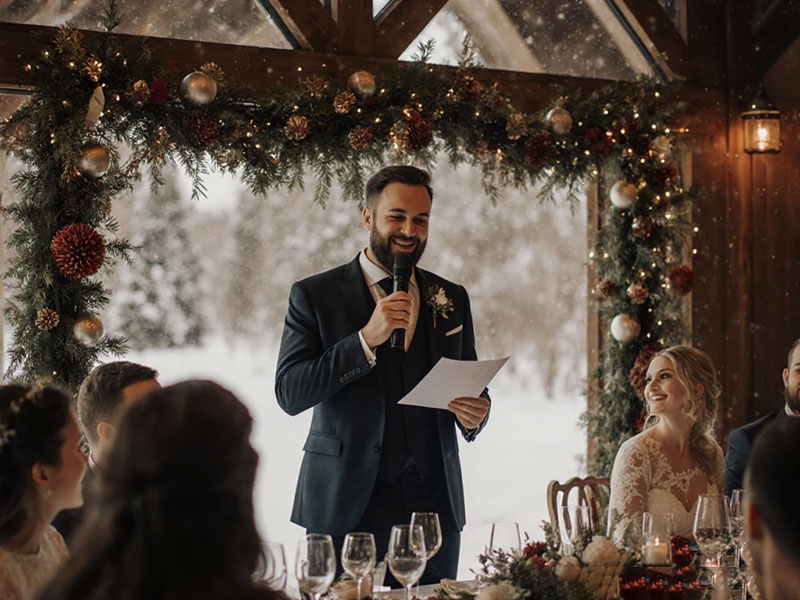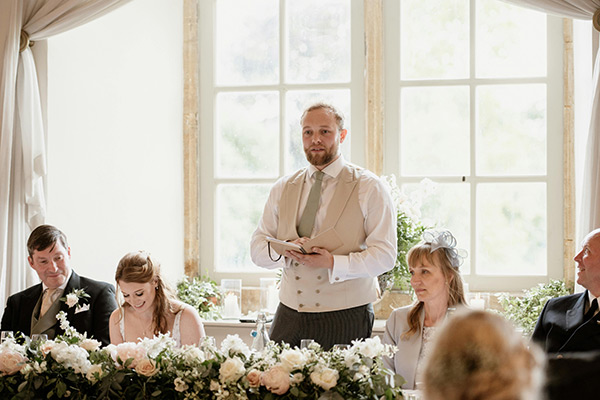Recent surveys suggest that over 26% of couples are now turning to AI assistance when crafting their wedding speeches. This isn't necessarily because they lack emotion or sincerity, rather, it's because they're seeking that perfect balance between heartfelt authenticity and polished delivery. The rise of AI-generated content has revolutionised how we approach wedding speech writing, yet it's also sparked important conversations about maintaining genuine emotion in what should be deeply personal moments.
The Modern Wedding Speech Dilemma
Traditional wedding speech advice has always emphasised authenticity above all else. "Speak from the heart," wedding planners would say. "Be yourself." Whilst this guidance remains sound, the reality for many couples in 2025 is that speaking from the heart doesn't automatically translate into a coherent, engaging speech that keeps guests entertained and moved in equal measure.
Consider Sarah and Emily, a couple from Manchester who married last spring. As Emily's sister prepared her maid of honour speech, she found herself paralysed by the pressure to capture their relationship perfectly. "I knew exactly what I wanted to say emotionally," she explains, "but I couldn't find the right words to structure it properly." Similarly, when James prepared his best man speech for his mate David's wedding to his partner Michael in Brighton, he struggled to balance the laddish humour their friendship was built on with the genuine respect he felt for their relationship.
These scenarios reflect a broader trend: couples and their wedding parties understand the emotional core of what they want to express, but they're increasingly seeking technological assistance to articulate these feelings effectively. This is where AI has stepped in, offering structure, vocabulary, and even creative inspiration that many find invaluable.
How AI is Transforming Wedding Speeches
The integration of artificial intelligence into wedding speech writing isn't about replacing human emotion, it's about enhancing human expression. Modern AI tools can analyse the tone you're aiming for, suggest structural improvements, and even offer alternative phrasings that might better capture your intended sentiment. For many, this technology serves as a sophisticated writing assistant rather than a replacement for personal input.
Take the example of Rebecca and Charlotte, who married in a beautiful ceremony in the Cotswolds. Rebecca's father initially struggled with how to address his daughter's relationship in his father-of-the-bride speech. Having come from a generation less familiar with LGBTQ+ relationships, he wanted to ensure his words conveyed complete acceptance and love without sounding forced or politically correct. Using AI assistance, he was able to craft sentences that felt natural to his speaking style whilst ensuring his message of unconditional support came through clearly. The result was a speech that moved guests to tears, not because it was artificially generated, but because the technology helped him express his genuine emotions more effectively.
Similarly, when Mark prepared his speech for his brother Tom's wedding to Lisa, he used AI to help structure his childhood memories into a coherent narrative. The artificial intelligence didn't create the memories or the emotions behind them, it simply helped Mark organise his thoughts in a way that would resonate with the wedding guests. The technology suggested transitions between anecdotes, recommended ways to tie disparate stories together, and even helped him identify which memories would be most appropriate for a mixed audience.
Balancing Convenience with Authenticity
The key challenge facing couples who use AI assistance lies in maintaining authenticity whilst benefiting from technological convenience. The most successful AI-assisted wedding speeches don't sound robotic or impersonal, they sound like enhanced versions of what the speaker naturally wanted to say.
Professional wedding planners are increasingly advising couples to use AI as a starting point rather than an end product. The technology excels at providing structure, suggesting vocabulary, and offering creative prompts, but the personal anecdotes, specific memories, and genuine emotions must come from the speaker themselves. This approach ensures that AI serves as a tool for amplification rather than replacement.
Consider the case of wedding speeches for same-sex couples, where speakers often want to acknowledge the significance of marriage equality whilst avoiding political overtones. AI can suggest language that celebrates love and commitment without becoming preachy or detracted from the celebratory atmosphere. However, the specific reasons why the couple's relationship is special, the particular memories that define their journey together, and the personal wishes for their future must originate from genuine human experience.
Practical Applications Across Different Relationships
The versatility of AI assistance becomes apparent when examining how different types of relationships benefit from this technology. For traditional heterosexual couples, AI often helps with structural elements, ensuring speeches have compelling openings, smooth transitions between topics, and memorable conclusions. The technology can suggest ways to incorporate family history, cultural traditions, or shared interests into the narrative flow.
For gay and lesbian couples, AI assistance frequently proves valuable in helping speakers navigate the unique aspects of same-sex relationships with grace and authenticity. When David spoke at his partner Jonathan's commitment ceremony, AI helped him find language that celebrated their relationship's journey through changing social attitudes without dwelling on past struggles. The technology suggested ways to focus on joy and future possibilities whilst acknowledging the significance of their union.
Meanwhile, speakers at lesbian weddings often use AI to help balance different family dynamics and relationship histories. When Anna's best friend prepared a speech for Anna and Sophie's wedding, she used artificial intelligence to help weave together stories from their separate friend groups, ensuring that guests from both sides felt included in the narrative. The AI suggested ways to introduce characters and provide context without bogging down the speech with excessive background information.
The Human Touch Remains Essential
Despite the growing prevalence of AI assistance, the most memorable wedding speeches still depend fundamentally on human insight, emotion, and connection. Technology can provide the framework, but speakers must fill that framework with genuine sentiment, specific details, and personal authenticity that resonates with their audience.
The most successful AI-assisted speeches share several common characteristics: they maintain the speaker's natural voice and personality, they include specific anecdotes and details that only close friends or family would know, and they demonstrate genuine understanding of the couple's relationship dynamics. These elements cannot be artificially generated, they must come from real human experience and observation.
Furthermore, delivery remains entirely human. AI can suggest pauses, emphasis points, or structural elements, but the actual performance, the eye contact, the genuine emotion, the spontaneous reactions to audience responses, these remain uniquely human contributions that no technology can replicate or replace.
Looking Forward: The Future of Wedding Speeches
As AI technology continues to evolve, its role in wedding speech preparation will likely become even more sophisticated. Future developments might include tools that can analyse audience demographics to suggest appropriate humour levels, or systems that can help speakers practice delivery by providing feedback on pacing and emphasis. However, the fundamental challenge will remain the same: how to leverage technological assistance whilst preserving the authentic human emotion that makes wedding speeches truly memorable.
The couples who navigate this balance most successfully view AI as they might view any other wedding vendor, a professional service that enhances their special day rather than defining it. Just as couples might hire a photographer to capture their memories professionally or a caterer to ensure their guests are well-fed, they're increasingly comfortable using AI assistance to ensure their speeches are well-crafted and effectively delivered.
The 26% of couples currently using AI assistance in their wedding speech preparation represent an early wave of what will likely become standard practice. As the technology improves and social acceptance grows, we can expect this percentage to increase significantly. However, the couples who create the most impactful speeches will continue to be those who understand that AI is a tool for enhancement, not replacement, of genuine human emotion and connection.
Wedding speeches in 2025 demonstrate that technology and tradition need not be opposing forces. Instead, they can work together to create moments that are both professionally polished and deeply personal, speeches that honour the past whilst embracing the future, much like the marriages they celebrate.
Why rely on artificial intelligence when you can access thousands of genuine, heartfelt lines? Ultimate Wedding Speech offers the perfect alternative to AI-generated content. Our extensive library features pre-written lines covering every type of wedding, from traditional ceremonies to same-sex celebrations, with content tailored for different writing styles, subjects, and orientations. Whether you're the best man struggling with humour, a maid of honour celebrating your best friend's love story, or a parent welcoming a new family member, we've got authentic lines that speak from the heart without losing that personal touch AI simply cannot replicate. Stop wrestling with algorithms and start with words that have already moved real audiences to tears and laughter. Join Ultimate Wedding Speech today and discover why thousands choose genuine human inspiration over artificial alternatives.
Crafting the perfect wedding speech can be a challenging task. But you don't have to do it alone. Sign up to Ultimate Wedding Speech for only £4.99 and gain access to the world's largest collection of example content for wedding speeches. With our diverse and extensive library, you'll find inspiration that perfectly matches your style, sentiment, and message. From funny anecdotes to heartfelt passages, traditional toasts to modern musings, we've got it all. Don't miss out on the opportunity to move your audience and make an unforgettable impact on the special day. Join the ever growing list of satisfied speechmakers who have found their perfect words with us. Let us help you create a wedding speech that is as unique and memorable as the love story you're celebrating.




